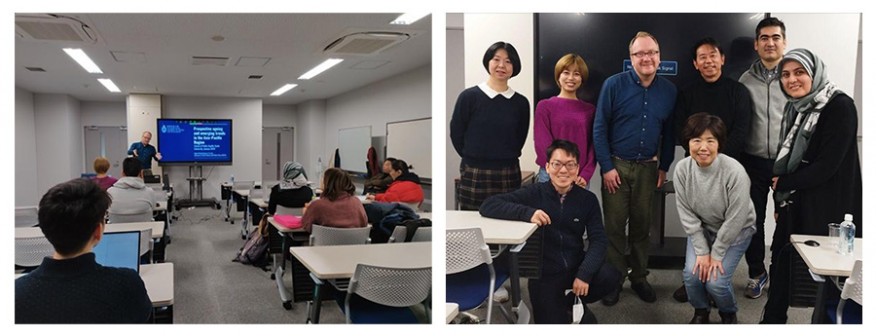Prospective Ageing and Emerging Population Trend in the Asia-Pacific Region
Report: Kyoto University School of Public Health International Lecture: Prospective Ageing and Emerging Population Trend in the Asia-Pacific Region
In the afternoon of January 23, 2024, an international lecture on “Prospective Ageing and Emerging Population Trend in the Asia-Pacific Region” was held at the School of Public Health, Graduate School of Medicine, Kyoto University (KUSPH). About 15 students and faculty members from KUSPH participated in this international lecture, which was held in a hybrid format, on-site and via ZOOM. Prof. Stuart Gietel-Basten, a professor of Social Science and Public Policy at the Hong Kong University of Science and Technology and Associate Director of the Leadership and Public Policy Executive Education Program and Prof. Rintaro Mori, visiting professor for collaborative graduate school courses at Kyoto University were invited as guest speakers. The purpose of this international lecture was to discuss on population ageing.
First, Prof. Gietel-Basten introduced the trend of population ageing. He said that population ageing is a global issue, and Asia will be a center of ageing people in near future. As it is a global issue, but the system differs to the country, transfer the system such as long-term care from country to county is needed.
These days, there is an image that ageing is negative and that there is nothing we can do about it. Although, originally, ageing is a symbol of human success. We should explore how to see in the positive view. When we “reframe” the issue, there are a number of good points of ageing. For example, older people are getting younger and remaining life expectancy is getting longer. As age itself have no meaning, we cannot set a clear delimitation. There will be increasing number of people with higher educated; therefore, the ability of people in each generation will be of enhanced. Advances in technology allow people to work even if they are physically weak (This is called “Gerontechnology”). Secondly, demographic dividends will allow revitalization of the silver economy, instead of spending money to their children.
At the end of the lecture, Prof. Gietel-Basten stated that if you are interested in public health or life course approach, he highly recommended us to be concerned with demographic arguments, beyond the age or the different type of health problems.
After the lecture, lively discussion was held on the topic of declining birthrate, gender gap, generation gap, education, financial issue, and international comparisons. At last, Prof. Mori concluded the lecture with the message that demographic perspectives are important to consider what will shape the future world. Also, critical thinking is needed that people or population itself is not a problem, but the social system is a problem. To make our society better, the system is needed to be changed.
